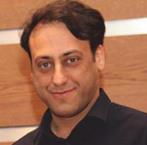Invited Speaker---Dr. Roie Yerushalmi

Dr. Roie Yerushalmi, Associate Professor, Institute of Chemistry and the Center for Nanoscience and Nanotechnology, The Hebrew University of Jerusalem, Israel
Prof. Roie Yerushalmi received his Ph.D. in chemistry from the Weizmann institute of science, Israel, in 2005. During 2006-2008, he pursued postdoctoral research in the field of nanoscience, in the lab of Prof. Ali Javey at UC Berkeley. In 2008 he joined the institute of chemistry at the Hebrew University of Jerusalem, Israel. Since 2015 he is Associate Professor at the Hebrew University. His research combines molecular level design and surface chemistry in the context of nanoscience and materials science. His main research interests focus on the design and synthesis of hybrid nanostructures for photocatalysis, electrical & optical applications, and energy harvesting. The research program includes the development of new methodologies for combining surface chemistry and materials science research of atomic and molecular layer deposition schemes, nanowire synthesis, hybrid nanostructures, ex-situ doping of nanostructures, nanostructure array assembly, and comprehensive characterization of complex nanostructured systems by the application of analytical methods. Prof. Yerushalmi received a starting grant from the ERC (European Research Council), the Krill Prize from the Wolf foundation, the career development award from the Human Frontier Science Program, and the Kennedy prize.
Speech Title: Functional Nanowires for Device Applications
Abstract: Programmable introduction of heterogeneity at the nanoscale plays a key role in the design of functional building blocks for catalysis, electronic devices, and numerous other applications. Synthetic strategies for attaining well-defined heterogeneity in structure, shape, composition, and modulation of the electronic structure at selected regions of the nano system is therefore highly desired. Methodologies for post-synthesis modification and symmetry breaking of semiconducting nanowires will be discussed. Ex-situ doping using monolayer doping techniques enables the transformation of un-doped silicon nanowires into heterogeneously doped building blocks featuring sharp p-i-n junctions across nanowires. Relying on surface chemistry provides an accurate dose and initial positioning together with fine control over the diffusion processes. Self-processing synthesis of hybrid metal-semiconductor structures termed Nano-Florets. The hybrid nanostructures obtained for the coinage metals resemble the morphology of grass flowers, consisting of a high aspect ratio SiGe nanowire (NW) with a metallic nanoshell tip. The synthesis involves an autonomous sequence of selective etch and deposition steps which are self-initiated and self-terminated resulting in the hybrid nanostructures. The new class of structures is useful in a variety of applications including chemical sensing and broad-band optical detectors owing to the unique structural characteristics and electronic properties of these hybrid systems.



